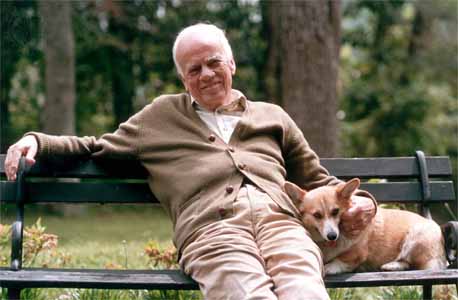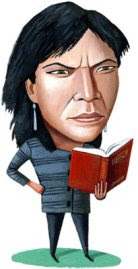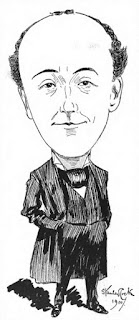I’m
thinking now I should have re-read Walker Percy’s six novels in the
order they appeared, and I’m trying to understand why I chose to do
it randomly. It’s just occurred to me I might have started the
re-reads the way I started the first-reads---at least at first. The
Moviegoer
appeared first, and I read it first and have no recollection what
drew me to it. I’ve since read it twice more, most recently three
years ago before I decided to read the other five again, as well. I
recall that
years after reading Moviegoer
a
reporter colleague at the newspaper that employed us recommended
either The
Last Gentleman
or The
Second Coming,
and I read the one she suggested, which hooked me so thoroughly I
then read the others on my own, as well as articles and interviews
and Percy’s nonfiction books.
This time
around my
Percy reading
hopped to
and fro
until I came to the two my colleague recommended decades ago. I chose
The
Second Coming
because at this point I remembered enough of it to know it was my
favorite of them all, despite the fact it’s the sequel to The
Last Gentleman,
which I intend to read next, and finally, one more time, The
Moviegoer.
There. That
said (I hate that expression), I remembered liking Coming
best because of the protagonist’s quirky romance with a young woman
he discovers while hunting an errant golf ball in a woods near his
home and abutting the golf course. I almost wrote “literally
stumbles upon” because he’d been falling down of late, and
possibly had fallen again in the woods moments before he finds her
living in an abandoned greenhouse there. I don’t remember all of
the falling down episodes other than that most of them occur on or
near the golf course. He’s approaching middle age and experiencing
the existential (psychological and philosophical) torments
characteristic of Percy’s male characters, and the young woman has
escaped from a mental hospital.
The
Second Coming
was described in a Christian Science Monitor review as “a
comedy shot through with serious observations.” That’s a fine
description, which I could have paraphrased without crediting its
author, Elizabeth
Muther,
but I wanted an excuse to link you to her review, which is better
than anything I might write here. (It’s not that I’m humble,
just...well, I think it’s dumb to try to reinvent wheels that have
been around thirty-seven years by people who invent such things for a
living. So I won’t do a plot synopsis or a philosophical analysis
of Coming
or rave about Percy’s cleverly satiric approach to his favorite
theme:
the search for meaning in a social culture that stifles individual
awakening in a hothouse atmosphere of stale routine and expectations,
other than to note that his caricatures of moneyed Southern
archetypes are either dead-on or seem so because he’s such a damned
good writer and the only vivid exposure I’ve had to moneyed
Southern archetypes is from his damned good writing—even though
I’ve lived in Virginia for nearly half a century.)
That said (Jesus, I hate that
expression!), what drew
me to Coming
this time was the recollection of the romance between the
falling-miserable-moneyed-slowly-going-nuts protagonist (with whom I
identified—as always) and the
nubile-amnesiac-slowly-exhibiting-sanity greenhouse dweller who hits
it off with him (me). I’m discovering more and more that my
long-held notion of being an encrusted, oh-yeah cynical newsman was
something of a sham and am trying to hang
onto at least some of
that protective illusion by resisting my subliminal, puerile romantic
inclinations inch by hard-fought inch, yet I enthusiastically gave
myself a mulligan on this one, because, well, it’s Percy, what the
hell. (And the girl “smells good.”)
I always give you, my faithful
readers, a quote or two to both stretch out these reports a tad to
make room for the illustrations, as well as to give you a taste of
the author’s style. Writers are always told to “show, don’t
tell,” so instead of telling you, as do most of the professionals,
about an author’s craftsmanship, wit, grace, what have you, here’s
a typical sampling. It not only covers all of the bases mentioned in
the above sentence, it addresses an aspect of Percy’s work that
invariably appears in critiques of his work, i.e. his Roman
Catholicism, to which he converted and defended eloquently ever
since. He keeps it sly and indirect in his fiction, and is not afraid
to poke a little fun at the religious. Here’s what I mean:
“IT WAS A
FINE SUNDAY morning. The foursome teed off early and finished before
noon. He drove through town on Church Street. Churchgoers were
emerging from the eleven-o’clock service. As they stood blinking
and smiling in the brilliant sunlight, they seemed without exception
well-dressed and prosperous, healthy and happy. He passed the
following churches, some on the left, some on the right: the
Christian Church, Church of Christ, Church of God, Church of God in
Christ, Church of Christ in God, Assembly of God, Bethel Baptist
Church, Independent Presbyterian Church, United Methodist Church, and
Immaculate Heart of Mary Roman Catholic Church.
“Two
signs pointing down into the hollow read: African Methodist Episcopal
Church, 4 blocks; Starlight Baptist Church, 8 blocks.
“One sign
pointing up to a pine grove on the ridge read: St. John o’ the
Woods Episcopal Church, 6 blocks.
“He lived
in the most Christian nation in the world, the U.S.A., in the most
Christian part of that nation, the South, in the most Christian state
in the South, North Carolina.”
The title?
Oh, that. Percy and I (via his protagonist, Will Barrett) have a
little fun with the biblical notion of End Times. Nothing serious...I think.
 |
| Nah...? |
[For
more Friday's Forgotten Books check the links on Patti
Abbott's unforgettable blog]
















